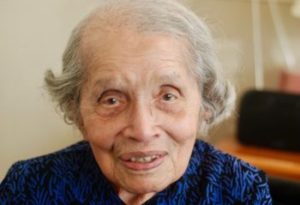
Esther Cooper Jackson
*Esther Cooper Jackson was born on this date in 1917. She is a Black civil rights activist and former social worker.
Born Esther Cooper in Arlington, Virginia, she came from a family active in their community. She once said, “Our parents always told us that if we got the grades, and passed the tests, that they would make sure that we would go to any college of our choice. So, they didn't go in for a lot of expensive furniture or anything else. We had lots of books, and at home reading of poetry, we had the Harvard Classics and all that. Their values were passed on to us.”
Throughout her youth, her mother, Esther Georgia Irving Cooper, served as President of the Arlington branch of the NAACP and was involved in the struggle for American Civil Rights, particularly in efforts to achieve equality in the quality of children's education. Cooper attended segregated schools as a child but went on to study at Oberlin College and earn a master's degree in sociology from Fisk University in 1940. Her 1940 thesis was "The Negro Woman Domestic Worker in Relation to Trade Unionism."
Upon graduation, she received a Rosenwald Fellowship to support a study on the attitudes of Black youth toward World War II. She planned to conduct the study as part of her studies for a PhD. in sociology at the University of Chicago. After graduate school, Jackson became a member of the staff of the Voting Project in Birmingham, Alabama, for the Southern Negro Youth Congress (SNYC). While working with SNYC, she met her future husband, James E. Jackson Jr. In an interview with Ian Rocksborough-Smith in 2004, Jackson explained that her husband, James Jackson, and the SNYC had in 1937 helped tobacco workers in Virginia successfully agitate for an 8-hour day and pay increases. The tobacco workers held the first strike in Virginia since 1905, and their gains, according to C. Alvin Hughes, "helped SNYC earn a following among the Black working class in the South."
Originally intending only to stay for one summer, Jackson remained in Alabama for seven years, engaged in the struggle to bring down Jim Crow segregation. For seven years as a prominent leader of SNYC, Jackson worked with her husband, James Jackson, and numerous others, conducting campaigns promoting the rights of Blacks and poor whites. SNYC's agitation for integrating the public transportation systems was expected of the work it did digging the Southern soil, which became important in preparation for the struggles later on in the 1950s and 1960s. In 1952, she moved to New York City.
In New York in 1961, Jackson became managing editor of Freedomways along with Louis Burnham and Jack O'Dell from the Southern Christian Leadership Conference. Freedomways was the central theoretical journal of the 20th-century Black arts and intellectual movement in the United States. Its launch in 1961 attracted historians, sociologists, economists, artists, workers, and students to write on Black History, heritage, and culture. It ceased publication in 1985. Esther Jackson turned 102 in August 2019.